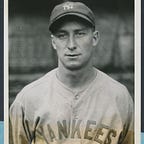Wednesday, April 27, 1927: New York
“Hoyt The Mortician”
 Waite Hoyt is called the “Merry Mortician” in the newspapers, but we never call him that. The New York Times writer John Kieran tagged him with the name, and not just because Hoyt buries people from the mound. Hoyt’s actually a mortician. Or, at least, apprenticing to be one.
Waite Hoyt is called the “Merry Mortician” in the newspapers, but we never call him that. The New York Times writer John Kieran tagged him with the name, and not just because Hoyt buries people from the mound. Hoyt’s actually a mortician. Or, at least, apprenticing to be one.
Hoyt’s father-in-law owns a funeral home in New Rochelle, which Hoyt’s wife wants him to inherit. As far as I can tell, it all makes perfect sense, since his marriage is basically dead. Even when we’re in New York, Hoyt’s rarely home at night, except for the evenings before he pitches — and on those nights, when he sleeps in his own bed with his wife, it has far more to do with his dedication to his craft than to his dedication to Mrs. Hoyt.
Hoyt’s dedication is newfound. This March, when he showed up at spring training in St. Petersburg, Miller Huggins took him aside for a very personal conversation. Huggins told Hoyt that while his last two seasons had been good ones, “This coming season, Waite, I think you can become a truly great pitcher, one of the best in either league. You’re 27 years old and it’s time to take your craft seriously. You have real greatness in you. And not just in your arm. It’s in your character. You can do things that matter.”
“Something about the way the little man looked in my eyes made me listen to him — hell, that was the first time I had ever even wanted to listen to him.”
Hoyt’s had trouble listening to anyone, ever since he was a kid, but he’s gotten by just fine on his own because he has all the talent in the world, and just as much confidence.
“I’m actually surprised he can pitch so well,” Benny Bengough said to me last year while we were watching Hoyt pitch a two-hitter against the White Sox. “You’d think his two balls would constantly get in his way, they’re so goddamn big.”
Hoyt’s balls have been large ever since he was a small boy.
He was a child prodigy from Flatbush who started throwing batting practice to the Brooklyn Robins and John McGraw’s New York Giants when he was barely 15. That year, young Hoyt led three different amateur teams to their summer league championships and pitched back to back no-hitters for his high school team at Erasmus Hall. He made national news when he became the youngest player ever to sign a major league contract — actually, he only co-signed it, his father also had to put his X on the page because Hoyt was too young to legally sign on his own. Right after McGraw signed him, Chief Meyers, the Giants’ whip-smart Indian catcher, gave Hoyt his real baseball nickname, “Schoolboy.”
After a couple of seasons in the minors, Schoolboy got tired of McGraw jerking him around. Almost all of McGraw’s major and minor league players feel that way, but few have the balls to do anything about it. Not Schoolboy. He walked away from the team, preferring to play semi-pro ball in Baltimore. McGraw became so fed up with Hoyt that he traded him to a Southern Association team down in New Orleans.
The 18-year-old Schoolboy told McGraw to go screw himself and refused to report.
Ed Barrow — now the Yankees business manager but back then the field manager of the Red Sox teams starring Babe Ruth — quickly offered Hoyt a contract to pitch for Boston. Schoolboy’s response was to whip out his big pair and tell Barrow that he would only sign with the Red Sox if they put a clause in his contract stipulating that they had to start him within four days of his arriving in Boston.
In his first start at Fenway, the kid beat the Tigers 2–1, in twelve innings, holding Cobb to one hit in five at-bats. Cobb was screaming at Schoolboy the entire game, trying to intimidate him. Schoolboy loved it. “With Cobb and me, it was hate at first sight.”
Schoolboy loves a big stage — in the ’21 World Series against McGraw’s Giants, he didn’t allow an earned run in 27 innings — and he loves the small stage, too. His father was a vaudeville comic, and the two sometimes performed together. In the offseason, while the other players are off barnstorming, Hoyt goes on vaudeville tours, telling stories, singing and joking with pals like Al Jolson and Jimmy Durante.
And, yet, Mrs. Hoyt wants Mr. Hoyt to become a mortician. She must really hate him.
Every now and then, in the service of the family mortuary business, Hoyt drives down to the Manhattan morgue to pick up dead bodies and bring them back to New Rochelle where his father-in-law gets paid to make the cargo look good in pine, or oak, or mahogany. Hoyt does these runs in the mornings before our games, and he’s turned his morbid excursions into what he calls “Breakfast and a Body” errands.
The Manhattan morgue is right near Chinatown, and Schoolboy loves Chinese food, even for breakfast. Last year he fell in love with a dim sum parlor on Doyers Street, Wing Sing’s Tea Parlor, that’s on the ground floor of a building that houses both the parlor and an opium den. Hoyt fiends for the dim sum. Sometimes after a late night in the city, as it’s starting to get light again, Hoyt will feel a little guilty about his family life, so he’ll go and fetch a body for his father-in-law. If he’s feeling a little hungry, before picking up the body he’ll make a stop at Wing Sing’s.
Last season, one morning after we had toasted the sun coming up together, Schoolboy took me on one of his “Breakfast and a Body” errands.
“Mr. Hoy-yat!” the Chinaman at the door greets Schoolboy as we arrive at the tea parlor. This restaurant is different from any of the other Chinese restaurants I’ve ever been in before. Most of those are up in Harlem, where the jazz players that Benny and I know are crazy about Chinese food. Hell, Louis Armstrong loves it so much that he made a record last year called “Cornet Chop Suey.” Of the half dozen Chinese restaurants in Harlem, my favorite is the Bamboo Inn, a black and tan joint that features good jazz bands and great lo mein. It’s the sort of place Steven and his pals love — lots of young women, including Vanity Fair girls who enjoy slumming in Harlem for a night.
Most of the cities we play in have a Chinatown. Boston has a great one. Cleveland’s Chinatown is also a hotspot for jazz, day and night. In Cleveland the bands are right inside the restaurants and start playing at lunch time. They take a break and then play for dinner, catch their breath and then play till 1:00 a.m., every day during the week and even later on Saturday nights.
Before we sit down to eat at Wing Sing’s, Schoolboy hands one of the Chinamen $20 and takes me through the restaurant’s kitchen and then down a back staircase to show me the opium den in the basement.
In many ways, the den looks like any of a number of the great brothels we go to, like the House of Good Shepherd in St. Louis, as opposed to the factory brothels in Chicago that Capone runs. Everything is red, black, green and plush. The girls are young and seem healthy and cared for, if a bit pale. But there’s something very different going on down here.
“Aren’t you worried about someone recognizing you?” I ask Schoolboy.
“Seriously? Look at that guy,” he says pointing to a white in a tuxedo fast asleep on top of a bar. “Babe Ruth in his Yankee uniform could walk up to that guy and shout, ‘Hi! I’m Babe Ruth!’ and he wouldn’t recognize him. Com’on, let’s go eat some dim sum and then head over to the morgue.”
It feels like we’re already in a morgue. An opium den is definitely not a speakeasy. Speakeasies are full of life, but there’s no life here. This is just a way station for death.
Back upstairs at Wing Sing’s there’s no menu, they just keep coming around with carts with different dumplings and other dishes on them. Schoolboy orders for both of us, mostly in English but also speaking a bit of Chinese that he tells me he’s picked up just from eating in so many Chinese restaurants. He may have dropped out of high school but he’s street smart. Actually, he’s much more than that, he’s extremely well read, including the classics, although he hides it around the team.
 After breakfast, we jump back into Hoyt’s car and head toward City Hall and the morgue. The process for signing out a body is a surprisingly quick one. Hoyt has paperwork that shows he’s a licensed mortician, and the morgue has the information regarding which body to give him based upon a phone conversation they had with his father-in-law. Schoolboy carries multiple body bags from the funeral home in his car, and he hands one to the clerk. A couple of minutes later two coloreds come out with a fully packed body bag on a gurney and load it into the back seat of Hoyt’s car.
After breakfast, we jump back into Hoyt’s car and head toward City Hall and the morgue. The process for signing out a body is a surprisingly quick one. Hoyt has paperwork that shows he’s a licensed mortician, and the morgue has the information regarding which body to give him based upon a phone conversation they had with his father-in-law. Schoolboy carries multiple body bags from the funeral home in his car, and he hands one to the clerk. A couple of minutes later two coloreds come out with a fully packed body bag on a gurney and load it into the back seat of Hoyt’s car.
“Shit,” says Hoyt as he gets behind the wheel and sees his wristwatch. “We’re going to be late. No way we get to the Stadium on time if I have to haul this body to New Rochelle first.” Schoolboy turns around and looks at the back seat. “Sorry, dead man, but you’re going to the Bronx.”
“Are you kidding me? We can’t just leave Mr. Habeas Corpus baking in your back seat.”
“Don’t worry,” Schoolboy assures me. “We’ll dump Habeas in the trunk, and I’ll call Dorothy’s father as soon as we get to the clubhouse and tell him to come pick the bag up. I’ve done it before. He’ll keep for an hour.”
When we get to the Stadium, most of the team’s parking spots are taken, so we have to park the car in the middle of the lot. There will be no shade for Habeas today. We open the back door to the car and haul the body from the back seat to its next temporary entombment, the trunk. I take the feet; Schoolboy grabs the head — good thing, as my ends slips and hits the pavement.
As we walk into the locker room Schoolboy sees our trainer, Doc Woods, and is about to ask him for a nickel for the payphone to call his father-in-law, when Doc interrupts him and says, “Huggins has been looking for you. He wants to see you, right away. It’s important.”
I accompany Schoolboy to the skipper’s office.
“Waite, I’m giving you the ball again today. I know you relieved yesterday for Sad Sam, but I need you on the hill. Shocker can’t go today — his arm needs more rest.”
“No problem, Hugg,” says Schoolboy, who has yet to sleep a minute since he woke up the day before, and was expecting to sneak in a much needed nap in the bullpen during the game.
Schoolboy immediately goes back to his locker, changes and heads out to the field. He’s energized by Huggins’ decision to start him and the chance to pitch against his old team, the Red Sox. Warming up in the bullpen, he’s got great stuff. “Put down any fingers you want today, Collins, it doesn’t matter,” he tells our new catcher, Pat Collins. Schoolboy has four pitches: a curve, a fastball, a three-quarter speed pitch and a palm ball. For his next two warmup pitches he throws a quick fastball with a hop, and a sharp curve with a wicked drop at the end. “Everything is nasty today, Patrick,” he says, winking at Collins.
Schoolboy’s got quite a pair.
For the first three innings against the Sox, Schoolboy is untouchable. No hits. No walks. No errors. Only two balls make it out of the infield, and those are a couple of weak pop flies to Meusel in left. Then comes the fourth inning.
In the top of the fourth, pitching comfortably with a 4–0 lead, Schoolboy starts off by striking out the Red Sox centerfielder for the second time. Then suddenly he starts stomping around the mound and swearing. “Goddamit! Goddammit! Goddammit!” We can hear him in the dugout. He’s kicking dirt all over the place. He tries to regain some composure, but walks the next batter on four pitchers. He then throws a batting practice pitch to the Sox right fielder, Roy Carlyle, who smacks it for a single to right.
Phil Todt, Boston’s weak-hitting first baseman, steps up to the plate and smokes the first ball he sees to center field. Earle Combs makes a terrific play to cut off the ball and hold Todt to a single, but since everyone knows Combs has a weak arm, the two runners ahead of him scamper around the bases and score.
Huggins sends Sailor Bob Shawkey out to the mound to try and settle down Schoolboy. Lazzeri and Dugan walk over to join them, but Schoolboy tells them to stay away from the mound — he’s only talking to Shawkey. Hoyt angrily says something and Shawkey starts laughing and pats Schoolboy on the back. Then Sailor Bob jogs back to the dugout and tells Huggins, “He’ll be fine.” Then he comes over to my end of the bench and sits down next to me.
“Go ask Doc Woods to bag up 20 pounds of ice,” he whispers.
I go into the locker room and talk to Doc, who quietly relays the instructions to one of the ballboys.
Back on the mound, Schoolboy walks the next batter, but then gets Fred Haney, who’s batting around .200, to hit into an inning-ending double play.
“What the hell happened out there?” I ask Schoolboy, as he takes a seat between Shawkey and me.
“The body! The fucking body! I suddenly remembered I never called my father-in-law to come pick up the body. Jesus Christ, all I could think of was how much my car is going to stink by the time this game is over. I just lost it.”
“Doc’s taking care of it,” whispers Sailor Bob. “Two of the ball boys are putting about 20 pounds of ice in your car trunk. I just hope we don’t go into extra innings.”
“I’m done running dead bodies back and forth,” says Hoyt out loud to himself. “No more. Done. I’m a goddamn New York Yankee. I’m not Charon making ferry trips across the river Styx to Hades. This shit is over.”
I’ve never seen Schoolboy angrier.
“What about Chinese food?” I ask him. “You giving that up, too?”
Schoolboy jumps up to run back out to the mound to start the fifth inning. He stops at the top of the dugout steps, turns around and points a finger at me. “I’ll see you at the Bamboo Inn, tonight at 10.”
Pitching with a newfound purpose and racing the melting ice, Hoyt flies through the Red Sox. Four of his last five innings go three up, three down. The game is over in a lightning quick, hour and thirty five minutes. The final score — thanks to a homer by Collins, and doubles by Gehrig, Meusel and even Schoolboy himself — is the New York Morticians 8, Red Sox 3.
Schoolboy’s got quite a pair.
- 1927 Yankees
- LOUIS Armstrong
- BENNY Bengough
- Ty Cobb
- Fred Haney
- WAITE Hoyt
- John McGraw
- Chief Meyers
- SAILOR BOB Shawkey
- STEVEN
- Phil Todt
- 1921 World Series
- BROOKLYN DAILY EAGLE, September 5, 1915: “Junior Eagle Pitcher Goes to Giants”
